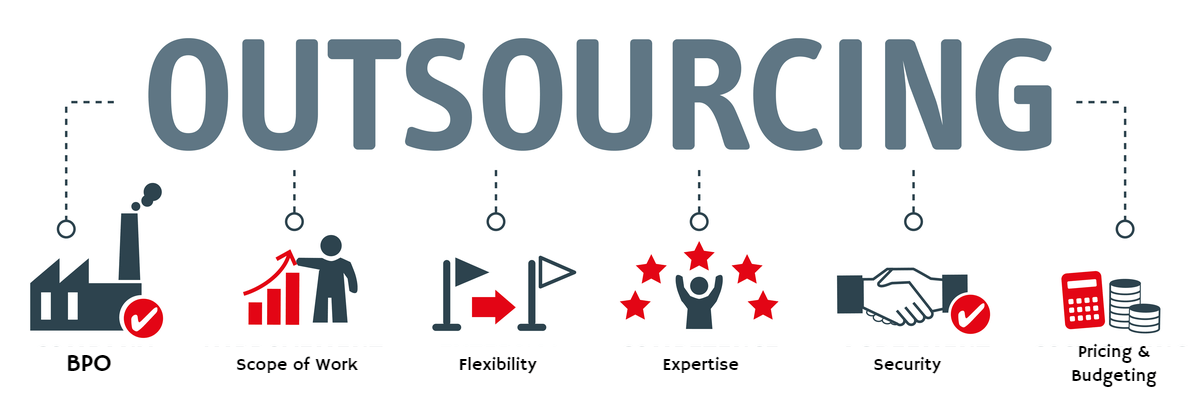IN THIS ARTICLE
Table of Contents
Companies of all sizes often struggle to expand operations while addressing backlogs in front and back offices. Both offices require dedicated teams, resources, and facilities to perform their responsibilities. But managing all of these responsibilities within your organization may increase costs and inefficiencies.
However, using business process outsourcing (BPO) solutions can help your company grow without costing you extra dollars. A BPO provider helps manage your front and back-office tasks while you focus on core operations.
If you plan to outsource processes, read on to discover what BPO is, why organizations use it, and how to choose the best BPO partner so that you can make an informed outsourcing decision.
What Are Business Process Outsourcing Solutions?

Business process outsourcing is the act of hiring a third-party entity to perform specific non-core activities for your business. A BPO provider handles business tasks that could be technical or non-technical.
Companies started to adopt BPO to support their data entry functions as early as 1988. Third-party service providers performed data entry outsourcing to assist law firms, microfilming companies, and other businesses in reducing operational costs.
Nowadays, demand for products and services frequently drives startups, mid-sized firms, and Fortune 500 organizations to outsource front-end and back-end functions. The necessity to reinvest resources also influences an organization’s decision to outsource. In addition, keeping up with or staying ahead of the competition requires business process outsourcing solutions.
According to Grand View Research’s latest report, the global BPO market was valued at $245.9 billion in 2021 alone. The business research and consulting firm noted that enhancing efficiency, minimizing operating expenses, and prioritizing core competencies drive the BPO market expansion.
Business Processes That Companies Outsource
Entities decide to employ a BPO provider to focus on primary efforts that contribute to their growth. Companies commonly outsource two types of their non-core business processes.
- Front-office services. The front office is an organization’s customer-facing business unit. It handles all services that directly cater to client needs, such as marketing, sales, and customer support. Its primary goal is to accommodate customer inquiries, concerns, and issues.
- Back-office services. The back office represents the administrative division of a company. It performs internal business processes, including records maintenance, regulatory compliance, accounting, and information technology assistance. Its main objective is to keep clerical tasks smooth and organized.
Industry Category per Third-Party Vendor Location
The BPO industry is divided into three categories based on the third-party vendor’s location.
- Onshore BPO. Providers offer services to domestic clients. A company can hire a third-party provider situated in another city or state to do specialized services. A New York-based corporation, for instance, can recruit an Arizona-based BPO vendor.
- Nearshore BPO. Vendors are close to their clients’ home countries. A company needing BPO services can hire a local provider. For example, a US corporation can hire a Mexican BPO vendor.
- Offshore BPO. Providers are outside their clients’ native countries. An organization can outsource tasks to a foreign provider. For example, a US corporation can hire a Philippine BPO provider.
If you are a beginner in this field, you need to know about customary outsourced services to help you create a more concrete plan if you decide to hire a BPO. Like other fields, the BPO industry also has its unique set of solutions to support your organization. Scroll down to know what the BPO industry has to offer.
5 Common Services Related to BPO Solutions

As the BPO industry expands, third-party providers also broaden the types of services they deliver. Below are some of the most commonly outsourced solutions.
Inventory Management
The process of monitoring and organizing stock defines inventory management. It involves tracking goods to ensure enough supply to fulfill customer orders. It also provides early warning of possible shortages in products.
As a retailer, you aim to satisfy both supply chain and customer demands. However, establishing an in-house team to manage your supplies might be operationally expensive, time-consuming, and labor-intensive. Furthermore, it can disrupt efforts to scale up your business.
Outsourcing can help ease the pain of increasing inventory backlogs. A provider of business process outsourcing solutions has cloud-based systems to automate stock auditing. It also employs skilled workers to streamline inventory management further.
Data Entry
Data plays a critical role in organizing and improving all your administrative tasks. From business development strategies to customer support services, proper data management underpins both decision-making processes and successful outcomes.
Nevertheless, collecting, handling, and analyzing big data might be exhausting and time-consuming. Data entry requires a dedicated team to focus on repetitive tasks. To maintain productivity and efficiency, you need to allocate enough resources to provide training, benefits, and salaries for your data entry specialists.
But to avoid high expenses, you can outsource your data entry services to a third-party provider. A BPO company can ease your workload while ensuring the proper handling of valuable data at low costs.
Bookkeeping
Bookkeeping refers to the practice of documenting your financial business transactions into organized accounts daily. Bookkeepers are responsible for recording credits and posting debits. Drafting financial statements and other reports to support supervisors is also part of bookkeeping tasks.
Bookkeeping is important to keep your financial files structured. Important as it is, however, it does not contribute to your enterprise’s growth. Time spent managing your books could instead be more valuable to use in expanding your business.
Hence, outsourced bookkeeping helps your in-house team focus on more productive activities while ensuring the accuracy of financial records. A third-party service provider helps your bookkeeping and finance teams solve daily issues. It also provides detailed reports to help you better understand your financial facts and make better decisions.
Help Desk Assistance
Providing information and support to an end user’s technical issues represents the primary purpose of a help desk. It is a central hub for consulting problems with electronic devices, computers, digital tools, and networks. It resembles a call center but only deals with IT solutions and services.
Help desk assistance is part of your company’s back-office tasks. Although it helps sustain your internal functions, the process does not greatly contribute to the growth of your business.
Thus, help desk support outsourcing offers an inexpensive option for troubleshooting issues. It also delivers increased efficiency and savings to your business while responding to customer complaints around the clock.
Customer Support
Customers drive your business and keep it running by creating positive and negative ratings of your goods and services. They influence how high or low your quarterly revenues and sales might be. Gaining–and keeping–your customers’ trust is important to maintaining your brand reputation.
You don’t want to miss a single opportunity to respond to customer questions and concerns. But setting up an in-house customer service team might be prohibitively expensive. Though key in building your brand, customer support can be a tedious, repetitive task that hinders you from working on your core functions.
As a result, outsourcing customer service is an excellent choice for increasing efficiency while generating savings. According to Fortunly, nearly 54% of all companies hire third-party support teams to engage with customers, demonstrating that businesses recognize the ability of outsourcing firms to address their client needs through 24/7 support.
These five services are a small portion of the overall business process outsourcing solutions available to you from a reputable BPO provider. But before trying out a new service or product, you should look for reviews about the experiences of prior consumers. These testimonies help you decide whether to pursue certain services and products, giving you an overview of their quality and positive results.
Suppose you are a startup, a small business, or a seasoned entity planning to outsource for the first time. You should know which specific companies have hired a third-party service provider.
5 Companies Using Business Process Outsourcing Solutions

According to Clutch, 66% of large businesses are more likely to outsource compared to small businesses due to increased productivity, cost savings, and access to a skilled workforce. However, small to medium enterprises willing to take risks and benefit from outsourcing can still try to look for a BPO provider that offers quality services at affordable costs.
Here are some of the large companies that prove using business process outsourcing solutions can help boost your enterprise.
Google taps BPO companies to provide development work, customer support, and offshore IT assistance. The massive search engine platform outsources these services to ensure improved client response times at a reasonable cost. The Philippines and India are where Google mainly outsources the said processes.
Facebook seeks help from third-party vendors to filter facts and identify fake news since it handles a considerable amount of public and private data. The company also outsources customer support, technical assistance, and content moderation services to external providers. The Philippines serves as the social media giant’s hub for acquiring BPO solutions.
Apple
Apple outsources its supply chain and manufacturing jobs to countries such as Mongolia, China, Korea, and Taiwan. Saving time is Apple’s major reason for outsourcing. In addition, the tech giant was able to prioritize its core capability — designing excellent and sophisticated products for people’s convenience.
The Coca-Cola Company
The Coca-Cola Company offers its Coke products at a low price thanks to bottle production and distribution outsourcing primarily located in the Philippines. It was able to build a vast network of bottling franchises and distributors, creating more competition and reducing costs. This approach allows the beverage supplier to focus on its syrup production.
Walmart
Walmart incorporates BPO solutions across its product manufacturing strategy. The approach enables the company to keep offering its products at low prices by establishing and outsourcing manufacturing plants in China. The American multinational retail corporation also started outsourcing finances and accounting services onshore to a New York-based company.
After identifying large enterprises that outsource important services, you now have an idea of how the BPO industry supports business processes. But if you are still unconvinced, keep reading to understand the driving factors for getting an outsourcing partner.
5 Reasons for Acquiring Business Process Outsourcing Solutions

In your every business endeavor, you need a list of reasons to make informed decisions. As a company planning to commission a BPO provider, you must know the primary factors that encourage businesses to outsource.
Reduce Costs
The first rationale for outsourcing corporate processes is to reduce costs while increasing capabilities. A recent Deloitte survey revealed that 88% of 600 worldwide business leaders said cost reduction is one of the reasons for outsourcing.
Using a BPO provider saves money on training, compensation, benefits, equipment, and office space. Fixed monthly payments for third-party business process outsourcing solutions replace such expenses. You can also lower these costs to fit your budget.
Prioritize Core Functions
Outsourcing repetitive, time-consuming, and labor-intensive processes like inventory management pave the way to grow your core business functions. Besides minimizing costs, a BPO provider can help improve the capabilities needed to increase your production capacity, establish your brand, and prioritize your strengths.
For example, your boutique needs a third-party outsourcing provider to handle the sewing and production segment. This step allows you to achieve your daily target quota. At the same time, your team can focus on making unique, extraordinary designs that appeal to both masses and elites.
Improve Productivity and Efficiency
Increasing productivity and reducing time limitations are two further advantages of outsourcing. For efficiency, businesses must reach their daily output targets. Your projects will be delayed if efficiency falters.
Hiring a third-party service provider is your best option to avoid such complex scenarios. It can handle your duplicative tasks more effectively while allowing you to work on improving your main products and services.
Tap Skilled Professionals
Recruiting, training, and retraining employees as part of establishing an in-house team is a long-term, labor-intensive job. Outsourcing can help eliminate this high-cost requirement by offering access to skilled professionals.
Every third-party provider has trained and certified its employees to work on business process outsourcing solutions according to their client needs. Expect that BPO employees are highly capable of operating advanced systems and handling numerous workloads to match your demands at low, fixed rates.
Lower Risks
A BPO provider cannot deliver its services if they do not have strict security rules on data privacy, hacking and cyber incident response. You can be certain that partnering with a third-party outsourcing firm will help you minimize risks to your data from various threats.
BPO companies also have a concrete plan to ensure the stability and preparedness of their systems against threats. As a result, they can rapidly perform mitigation measures to combat potential ransomware attacks, system disruptions, and mild risks.
Understanding why companies outsource enables you to make informed and solid decisions when planning to hire a third-party service provider. As a company looking to tap BPO services, you must know how to select your outsourcing partner properly to avoid conflicts and mishaps.
5 Tips for Choosing a Business Process Outsourcing Solutions Provider

Outlining areas to consider before making a decision is vital to your next move for business growth, especially when planning to outsource your non-core functions. Below are some tips for selecting your provider of front-office and back-office outsourcing services.
- Scope of Work. Before creating a budget and hiring a BPO provider, determine what services you want to outsource. Because you are investing resources and exposing sensitive information, outsourcing is not a test. The purpose of your intended outsourced business process should be clear and specific.
- Pricing and Budgeting. Create a budget for your outsourcing investment to ensure realistic funds and to avoid future shortfalls. Discuss your budget allocations and constraints with your potential partner to see if it can provide a price plan that meets your needs.
- Expertise. Seek a BPO solutions provider with proven expertise in the field. Examine your potential partner’s technical competence and skills, experience leading complex projects, and access to the latest technology systems. Check also the third-party vendor’s market reputation to ensure it can match your business objectives.
- Security. The Identity Theft Research Center reported a 17% rise in data breaches in 2021 compared to the previous year. When looking for an outsourcing partner, prioritize security. Negotiate a non-disclosure agreement with your potential outsourcing provider to protect your sensitive data.
- Flexibility. Hire an outsourcing firm that can quickly adapt to organizational modifications. As your business grows, your strategies and plans also change. Find a BPO provider that can be flexible enough to match your needs, even with different time zones.
Take note of these steps to choose the right partner for your back-office or front-office outsourcing services. These measures will also help you avoid spending extra money on unnecessary items. Meanwhile, you should know what actions to take after hiring your outsourcing vendor to maintain a meaningful and smooth relationship with your BPO firm.
5 To-Dos for Managing a Hired BPO Solutions Vendor

Completing a rigorous process of recruiting a third-party service provider does not stop the work on your outsourcing efforts. You need to continuously improve engagement with your BPO provider. By doing so, you can maximize the benefits of your settled agreement terms.
Here are some steps you can take to manage your hired company for delivering business process outsourcing solutions.
- Review Contract. Plan a contract signing meeting with your BPO provider to ensure all conditions fit both parties’ needs. Review the contract provisions to identify potential gaps and disputes, and when the contract details are finalized, sign and save your own copy for future reference.
- Be Involved. Participate in your BPO provider’s personnel training on your specific business processes. Despite their skill, you must guarantee that your outsourcing partner follows your standards and processes. This will assist you in attaining your operational goals.
- Communicate Regularly. Set weekly or monthly meetings with your outsourcing partner. Regular communications help identify the strengths and weaknesses of your BPO provider in fulfilling its responsibilities to your organization. The approach also informs the areas that need more improvements.
- Build Trust. Putting your business in the hands of a third-party service provider is a big step. Learn to trust your partner’s plan and execution so you can focus on your key competencies. You don’t need to monitor the vendor 24/7 because its staff is well-trained.
- Offer Incentives. Achievers’ newest research shows incentive programs can increase worker productivity by up to 44%. Though your main goal is to save money, which you will, you should still offer incentives to encourage your BPO provider to go above and beyond. The long-term benefits of keeping your BPO partner completely outweigh the relatively small cost of rewarding them.
After identifying your to-do list for overseeing your hired BPO vendor, you still need to know the advantages and disadvantages of outsourcing. Through this, you can manage your expectations about the results of investing in an external team to handle your non-core tasks.
Pros and Cons of Business Process Outsourcing Solutions

Benefits and challenges go hand-in-hand in any business investment. Therefore, expect that outsourcing some of your business processes does not always produce positive results. Explore the following insights to better understand the pros and cons of outsourcing.
The Advantages
- Free Up Resources. Outsourcing helps your business save money by eliminating the need to compensate new employees, buy equipment, and secure office space for specific front- or back-office tasks. A BPO provider offers these resources in a fixed-price package. You can reinvest the savings in other business tasks.
- Improve Competency. Hiring a third-party service provider to handle your repetitive, time-consuming processes allows you to focus on your strengths. It helps you improve your competency and enhance productivity. You can also emphasize applying your core expertise in developing high-quality products and solutions.
- Accelerate Work. Adopting BPO services could result in accomplishing tasks more rapidly. Because your outsourcing partner uses only your agreed business processes, expect its employees to perform their work on schedule. Your BPO provider also helps achieve your goal of ensuring accelerated time-to-market for your offerings.
- Ease Workload. Employing an outsourcing company enables you to ease your workloads and reduce your backlogs. Your BPO partner is responsible for handling your repetitive, time-consuming, and labor-intensive front- and back-office tasks. Thus, you have more time to work on your other important business activities.
- Provide Round-the-Clock Support. Getting a BPO provider lets you provide 24/7 support, especially when responding to customer needs and demands. Your foreign outsourcing partner uses your company’s time zone and alternating shifts. You needn’t worry about abandoned client questions and non-core duties.
The Disadvantages
- Lose Quality Control. Compromising quality control marks a downside in acquiring BPO solutions. You cannot constantly monitor your BPO provider’s work because you must prioritize other critical capabilities. If your selected outsourcing partner is not competent enough, you could see lower-quality products and services.
- Hidden Costs. Although outsourcing companies offer their services at low, fixed costs, there is a possibility that they are still charging hidden fees. These charges might cost you more without your knowledge. Therefore, read the contract thoroughly to avoid issues.
- Security Risks. Even though a BPO provider implements strict security policies and practical threat mitigation response efforts, you cannot avoid data breaches. Though unlikely, employees might still break an outsourced company’s data privacy regulations for personal gain. Review your outsourcing partner’s personnel backgrounds to ensure security.
- Different Time Zones. When working with a third-party provider overseas, varying time zones can hinder constant and stable communications. This factor also contributes to misunderstandings and conflicts. Thus, choose a business process outsourcing solutions provider that can accommodate the demands of your regional time zone.
- Language and Culture Barriers. Differences in language and culture can affect your outsourcing relationship. Misunderstandings and disagreements can impair both parties’ operations and processes. If possible, hire a BPO vendor that matches your language and culture.
Now that you know almost everything about the BPO industry, from common services offered to its positives and negatives, learn where these providers are located to better identify your most inexpensive but effective outsourcing option.
5 Countries to Consider When Acquiring BPO Solutions

Operating costs, competent personnel, and advanced technology skills may influence your decision to outsource business processes. To correctly manage your budget and business strategy, you need to understand these providers. Identifying their origin countries may help you balance internal and external funding.
India
India handles 56% of the world’s business process outsourcing solutions, according to a study published in the Shanlax International Journal of Commerce. IT, software development, and customer support are some of the most common services Indian BPO companies offer.
The abundant workforce skilled in science and technology has made India a target destination for multinationals to outsource their back-end operations. Not long ago Forbes reported that the country generated the most STEM graduates worldwide at 78 million. These highly experienced professionals are trained to provide 24/7 support.
The cost of outsourcing to India, which is far cheaper than in developed nations, is another reason companies flock to the country to use BPO services. One can expect to hire Indian developers at an average of $25 per hour.
Big companies that outsource their business processes to India are Amazon, AT&T, Dell, Ford Motors, HP, and Microsoft.
The Philippines
The Philippines is known as the “BPO Capital of the World” because of its high English fluency. Based on data from the European Fellowship’s English Proficiency Index for 2021, the Philippines took 18th place among 100 countries with a score of 592. The country’s world-recognized education system and hospitality culture also contribute to its title.
As data from Nexford University shows, the Philippines holds 10% to 15% of the global BPO market. Voice and non-voice customer service roles and back-office functions are the country’s typical business process outsourcing solutions.
The low outsourcing cost, which varies depending on each job function, entices foreign companies to acquire BPO services in the country. For instance, the average price for a Filipino customer service representative is $5 per hour on the low end and $12 per hour on the high end if outsourcing at a call center in the Philippines.
The Philippine government also enacted favorable tax laws, like the Philippine Economic Zone Authority (PEZA), to attract foreign countries to its BPO industry. Specifically, PEZA allowed outsourcing providers to receive tax exemptions. American Express, IBM, LinkedIn, Nike, UnitedHealth Group, and Wells Fargo are some of the large entities that outsource to the Philippines.
Ukraine
Ukraine is known as one of the IT outsourcing destinations for Fortune 500 companies, with a growth rate of 36% and a total export market value of $6.8 billion in 2021. As a result, Ukraine is quickly earning outsourcing popularity in Eastern Europe. For example, the Global Sourcing Association of the U.K. recognized Ukraine as the “Delivery Destination of the Year 2021.”
The country has become a hotspot for IT outsourcing mainly because of its large talent pool and lower-cost labor. According to Ukrainian product development studio Uptech, the country produced 212,000 IT specialists in 2021. Ukrainian experts would also work for the rate of $30 to $60 per hour compared to the usual $100 per hour.
Call center support, lead generation, telemarketing, and software development are other services that foreign companies outsource to Ukraine. Bosch, eBay, Intel, Oracle, Nokia, Samsung, and Wix are some well-known brands that outsource to the country.
However, the IT outsourcing market dramatically changed when Russia invaded Ukraine on Feb. 24, 2022. Several companies evacuated their employees and contractors out of Ukraine to limit the damage while continuing operations. For example, Business Standard reported that Israeli software company Wix moved its employees to Poland and Turkey.
Poland
Poland is one of the largest IT software outsourcing entities in Eastern Europe. According to Statista, Poland’s IT outsourcing market revenue reached $2.3 billion in 2021. The country also has inexpensive outsourcing labor costs, ranging from $43 to $65 for software development.
Foreign companies looking to outsource their IT functions choose Poland because of its highly qualified professionals. Polish IT experts are well-known for having broad coding experience since starting their professional careers. In fact, 7.7% of children aged five to 10 in the country have already familiarized themselves with code.
Polish outsourcing providers have excellent security policies. These third-party providers follow the EU’s General Data Protection Regulation for internet protocol and data security. In fact, Atos, Capgemini, Comarch, Credit Suisse, IBM, and Nokia outsource to Poland.
Since Poland shares a 332-mile border with Ukraine, it has accommodated Ukrainian refugees of the ongoing Russian invasion. It also houses some IT employees from large companies that fled from Ukraine to continue operations.
China
China’s BPO market value reached $15.03 billion in 2021, according to the latest report from Grand View Research. The market research and consulting firm also projected that the Chinese outsourcing industry will continue to expand at a compound annual growth rate of 11.3% from 2022 through 2030.
Low-cost manufacturing is the primary factor urging companies to outsource to China. The country is a manufacturing hub of quality electronic devices and other products due to a large pool of skilled researchers, engineers, and scientists. According to the United Nations Statistics Division, as shared by Statista, 28.7% of global manufacturing output in 2019 came from China.
Moreover, cheap labor costs attract huge enterprises to acquire business process outsourcing solutions in China. As of July 2021, approximately $4,530 is the average wage of a Chinese employee per month. It is much lower than a monthly salary of about $7,900 in the U.S.
Medical products, electronics, plastics, clothing, and textile are the primary industries that rely on Chinese manufacturing. Amazon, Apple, and Pfizer are some of the big American companies that outsource to China.
By now you have discovered the primary countries that are home to leading entities offering BPO services. Yet, you still have no idea what BPO opportunities await you in the future. Find out more below.
The Future of Outsourcing

The BPO industry shows no signs of slowing down. According to Precedence Research, the global BPO market is projected to be worth approximately $576.98 billion by 2030. The worldwide market research and consulting organization also noted that the industry is projected to grow at a compound annual growth rate of 8.9% from 2022 to 2030.
Advancements in emerging technologies are expected to contribute further to the BPO market’s continued growth. Artificial intelligence, machine learning, robotic process automation, and big data analytics are examples of these emerging technologies.
In particular, robotic process automation is anticipated to continue simplifying the workflow for delivering business process outsourcing solutions to keep pace with the market competition. These technologies will result in more cost reductions, efficiencies, and streamlined tasks.
Although future-oriented BPO companies are working to deliver upgraded measures to improve their services, they continue to explore ways to enhance and strengthen their workforce. They aim to keep honing, training, and reskilling their employees to fill more strategic roles.
On the other hand, underestimating service costs remains a major challenge for the growth of the BPO market during Precedence Research’s forecast period. Organizations often overlook operating costs and hidden fees related to hiring a BPO vendor, currency conversion, and technology upgrades. These gaps lead to the miscalculation of budgets that might affect a company’s overall performance.
The Bottom Line
Trying out business process outsourcing solutions can be beneficial to the growth of your business–and you must weigh outsourcing carefully. Employing a BPO provider can help your company save resources, increase efficiency, and meet market demands. However, it can also cause a diminishment in quality control, require extra costs, or potentially pose security threats if not properly monitored.
To maximize the advantages and minimize the disadvantages of outsourcing, know the basics before looking for a BPO partner. Understand the dos and don’ts of hiring a third-party service provider, especially if you are a beginner in the field. You’ll save funds, resources, and effort when acquiring BPO solutions.





